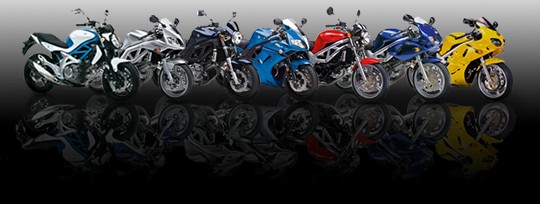 |
 |
Idle Banter For non SV and non bike related chat (and the odd bit of humour - but if any post isn't suitable it'll get deleted real quick). There's also a "U" rating so please respect this. Newbies can also say "hello" here too. There's also a "U" rating so please respect this. Newbies can also say "hello" here too. |
 |
|
|
Thread Tools |
|
|
#131 |
|
Guest
Posts: n/a
|
Mr Anderson, I like both of those pics, very interesting and well-framed. I'm personally not a fan of post processing, so your two images as they are, although I agree the mods Boot made do add something, I think they were perfectly good enough beforehand
|

|
|
|
#132 | |
|
Guest
Posts: n/a
|
Quote:
Post processing is developing. Before the advent of digital, many of the adjustments you now make in the digital darkroom, would have been considerations before the event, such as film type, film speed, and with black and white especially, with filters, on top of the work carried out in the darkroom after. The developing process is now, to say the least, a lot less messy. There was still plenty of work done with dodging and burning ('tis where the tools got their names) and the rest, to get images how the photographer wanted the final print. |
|

|
|
|
#133 | |||||||
|
Guest
Posts: n/a
|
Quote:
Quote:
Of these, chroma noise is the most objectionable and can usually be found in the shadow areas of the pictures (less information there). Luminance noise will usually be found in big smooth areas like the sky. Now if you keep in mind that the D90 sensor is rather well behaved where noise is concerned (I believe it's still considered the best 1.5x crop sensor in the market together with the D300 / D300s / D5000), especially in the luminance side of things, and that you've effectively tossed away your chroma noise by converting your pics to B&W, you'll easily undertand why you didn't get the "film grain" effect you were looking for. On the other hand, boot is absolutely right: Quote:
Quote:
Quote:
Quote:
What's more, the digital camera itself is already post-processing the files right after you press the shutter button, before you take them into the computer. Nikon's "Picture Control" system is brilliant (I believe Canon has something similar, but I've never used it), where it allows the user to fully customise the picture processing parameters, including hue, saturation, contrast (with custom curves, if need be) and sharpness in camera. What this means is that an experienced user can actually program the camera to do the post-processing itself and save custom processing options for any given situation they come across before even getting the pictures into the computer. I prefer shooting raw files, with custom picture controls that will show my images on-camera to be as flat as possible (within reason) so I can take a look at my histogram and see where I stand exposure wise. This allows me to get home, import pictures into lightroom and take it from there, "developing" them into my vision of what was there when I took the shots. Is this wrong? Ansel Adams didn't think so. Obviously, getting it as close to the end result as possible on camera is always preferrable, but not always do-able. Quote:
If nothing else, ViewNX will allow you to shoot only raw files, then get home, import all your pics into it and export them back to jpg as the camera would have done in the first place if you think you don't need to do anything else to them. Last edited by Filipe M.; 10-01-10 at 12:55 AM. Reason: added bit of into about ViewNX |
|||||||

|
|
|
#134 |
|
Guest
Posts: n/a
|
Mmm I like those a lot mr.a
and Boot's slightly enhanced versions even more so. |

|
|
|
#135 |
|
fantabulas
Mega Poster
Join Date: Apr 2004
Location: Nr Durham
Posts: 4,940
|
had a go at cropping from that one that was too busy...
 adjusted some setting in Lightroom.
__________________
My Flickr photos |
|
|

|
|
|
#136 |
|
Guest
Posts: n/a
|
I like that Richie
Maybe even a crop putting the birds slightly to the right of the frame would work too - gives them somewhere to fly to. |

|
|
|
#137 |
|
Member
Mega Poster
Join Date: Aug 2005
Location: Tower Hamlets but with Shutters on the windows
Posts: 1,522
|
Mr Anderson, love those pictures fantastic!!
You may also if you have time go visit this ... http://www.nhm.ac.uk/visit-us/whats-.../wpy/index.jsp and for us mere mortals check out the winners of the junior competition http://www.nhm.ac.uk/visit-us/whats-...oup.do?group=2 and then cry at all the lovely toys 10 year olds have to play with these days!!!  If I could be half that good. 
|
|
|

|
|
|
#138 |
|
Guest
Posts: n/a
|
|

|
|
|
#139 |
|
Member
Join Date: Jun 2007
Location: South West London
Posts: 531
|
Right guys n gals, I have been doing a little messing around with Lightroom and Nikon Capture NX.
Here is the a before and after - keeping in mind that I really know very little about colours, balance, saturation etc. Before:  After:  Filipe, you're spot on about Capture NX - it is impossible to use. Lightroom is comparatively very easy to use and very intuitive. A very nicely written piece of software. So, have I got this photo looking better? |
|
|

|
|
|
#140 | |||
|
Guest
Posts: n/a
|
Quote:
Quote:
 ), I'll give it 10 stars rating. ), I'll give it 10 stars rating.Quote:
|
|||

|
 |
|
|
 Similar Threads
Similar Threads
|
||||
| Thread | Thread Starter | Forum | Replies | Last Post |
| CV Examples | gruntygiggles | Idle Banter | 5 | 24-09-09 04:16 PM |
| AR Photography | Gordon B | 2008 Annual Rideout | 12 | 30-06-08 08:42 AM |
| Examples of k8 Colours please? | Griffo | Photos | 12 | 17-05-08 07:07 PM |
| Photography Kit | southy1978 | Idle Banter | 0 | 19-02-08 11:19 PM |
| Photography | localhost | Idle Banter | 16 | 22-01-06 07:59 PM |